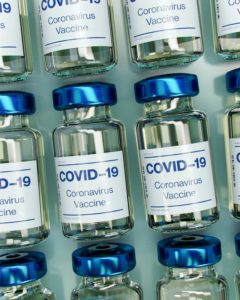The new SARS-CoV-2 variant was reported a few days ago in South Africa. Since then, it has been identified in Belgium, Botswana, United Kingdom, Israel, Canada, Germany, Netherlands, Australia, Denmark and Hong Kong. The world is on alert but so far conjecture is rife, with little scientific evidence to verify the impact.
The B.1.1.529 variant, or Omicron, has numerous mutations that have alerted scientists. The World Health Organization declared it a variant of concern last Friday because preliminary evidence suggests an increased risk of reinfection.
Omicron has 55 mutations from the original virus found two years ago in Wuhan. Thirty-two of the mutations are located in the S protein, which is critical for immune response. This accumulation of mutations has raised concerns and surprised many. Some experts believed that after the appearance of the Delta variant, it would be more difficult to find a variant like Omicron.

Is the Omicron alert justified?
The number of mutations, and the known effects of these, is cause for concern according to experts but experiments, laboratory results, epidemiological data and more real-world monitoring are still needed to understand their severity so it is difficult to make accurate estimates at this point.
Early reports suggest increased transmissibility and risk of re-infection. In the coming weeks, with more scientific information, it will become clear whether vaccines might be less effective with the new variant or whether it is more severe or not. But the unusual mutations could point to a different impact on infected people.
Omicron symptoms
At the moment, there is no evidence of more severe symptomatology. Dr. Angelique Coetzee, chair of the South African Medical Association, was the first to alert her country’s authorities to the possibility of a new variant. According to Coetzee’s statements to the BBC and AFP, Omicron has caused mild symptoms, therefore no hospitalizations or deaths have been reported yet.
The first patient Coetzee saw with unusual symptoms raised her suspicion of a new variant. The test confirmed that the clinical condition, which did not fully match the other variants, was Covid. Those infected show dry cough or itchy throat, muscle aches and extreme fatigue. A few have had a mild fever.
What measures will be taken?
The priority for scientists is to have more conclusive data on molecular typology. Likewise, in the laboratory, they must identify whether the antibodies created can neutralize the virus.
The general population, for its part, should continue with the same recommendations stipulated for months against Covid, such as the use of masks, ventilation of closed spaces, immunization and social distancing to reduce the circulation of the virus.
Flight restrictions
Different countries started to take measures shortly after the announcement of the new variant. Although the WHO has urged nations not to stigmatize countries where new variants are reported, and has advised against border restrictions, some European nations, as well as the United States, have closed flights to places such as Botswana, Malawi, Mozambique, South Africa, Zimbabwe, Swaziland, Namibia and Lesotho.
South African authorities have expressed concern over the measures and said they were being punished for reporting the variant. They described the bans as unjustified, and as a possible trigger to further affect the economy of the restricted countries, which want to recover after the pandemic standoff.
Just when the world thought that many of the travel restrictions between countries were over, this new variant brings some freedoms back into question. Concerns about global health and the global economy do not seem to be stopping any time soon.
Global concern
Criticism of the inequality in vaccination access was also heard from different parts of the world. For its part, the UN indicated that action must be taken to address the shortage of vaccines in poor countries.
This Monday, G7 health ministers met urgently to discuss the spread of the Omicron variant, possible new peaks, and the new challenges it poses to combat the virus, following WHO warnings about the high risk of Omicron escaping an immune response.
The dangers of transmissibility worry world leaders who are trying to contain the pandemic. But with no evidence of real risk, and many unknowns, some people are wondering whether the measures are overkill or necessary to avoid another unconscionable outbreak with severe consequences.
Image credits: Fusion Medical Animation and Daniel Schludi

